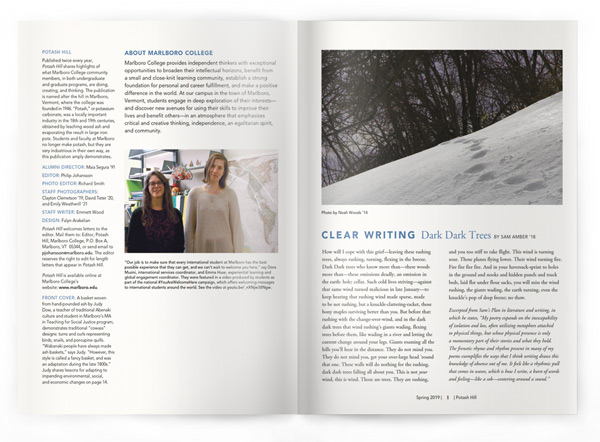Clear Writing

Dark Dark Trees
By Sam Amber ’18
How will I cope with this grief—leaving these rushing trees, always rushing, turning, flexing in the breeze. Dark Dark trees who know more than—these woods more than—these omissions deadly, an omission in the earth: hole; cellar. Such cold lives striving—against that same wind turned malicious in late January—to keep hearing that rushing wind made sparse, made to be not rushing, but a knuckle-clattering-racket, those bony maples surviving better than you. But before that: rushing with the change-over-wind, and in the dark dark trees that wind rushing’s giants wading, flexing trees before them, like wading in a river and letting the current change around your legs. Giants roaming all the hills you’ll hear in the distance. They do not mind you. They do not mind you, get your over-large head ’round that one. These walls will do nothing for the rushing, dark dark trees falling all about you. This is not your wind, this is wind. Those are trees. They are rushing, and you too stiff to take flight. This wind is turning sour. Those planes flying lower. Their wind turning fire. Fire fire fire fire. And in your haversack-sprint to holes in the ground and nooks and hidden panels and truck beds, laid flat under flour sacks, you will miss the wind rushing, the giants wading, the earth turning, even the knuckle’s pop of deep freeze; no thaw.
Excerpted from Sam’s Plan in literature and writing, in which he states, “My poetry expands on the inescapability of isolation and loss, often utilizing metaphors attached to physical things, but whose physical presence is only a momentary part of their stories and what they hold. The frenetic rhyme and rhythm present in many of my poems exemplifies the ways that I think writing draws this knowledge of absence out of me. It feels like a rhythmic pull that comes in waves, which is how I write, a burst of words and feeling—like a sob—centering around a sound.”
Photo by Noah Woods ’14
